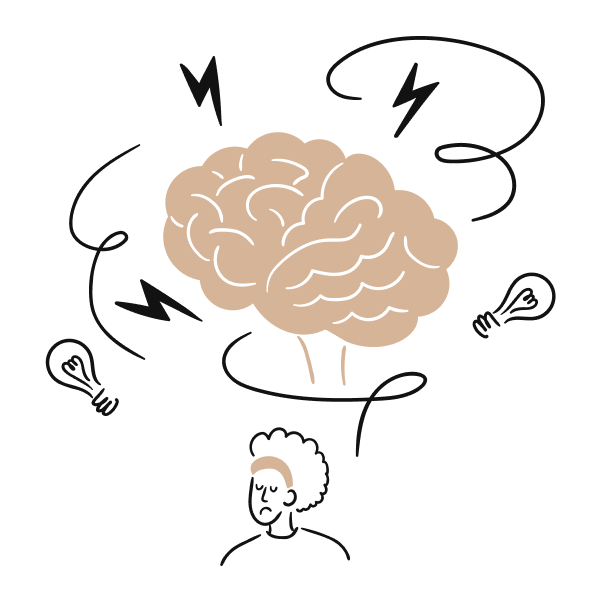⇥ Go to – I am having a panic attack
Your heart is pounding in your throat and you’re sweating. Your breathing is rapid and uncontrolled. You are afraid you will go crazy, pass out or even have a heart attack: you are suffering from a panic attack. What is a panic attack, how can you recognize the signs and how can you prevent a panic attack?
I am having a panic attack: what can I do?
1. Reassure yourself or the other person in this moment.
Are the symptoms recognizable because a panic attack has also occurred before? Keep in mind that these are feelings of panic that will also pass.
2. Realize that these are feelings of panic.
You are not really having a heart attack and you won’t faint.
3. Try to breathe calmly.
Breathing into a paper or plastic bag won’t help. What you can do is slow down your breathing: breathe in for 3 seconds and out for 6 seconds. If that doesn’t work right away, try again. You will slowly notice that breathing improves.
4. Take a sip of water.
5. Distract the thoughts using the “5, 4, 3, 2, 1 exercise:
-
- Describe for yourself 5 things you see in the room;
- Name 4 things you can feel right now. For example, think of your feet touching the floor or the air you feel flowing up your nose;
- Name 3 things you can hear now. Maybe you hear traffic outside or you hear the dishwasher running;
- Name 2 things you can smell right now or 2 smells you find pleasant;
- Name 1 thing you can taste.
6. Talk to someone.
What is a panic attack?
Did I have a panic attack? Symptoms of a panic attack
A panic attack involves several symptoms, but that doesn’t mean you experience them all. Officially, a panic attack is a sudden wave of anxiety accompanied by 4 symptoms or more at the same time. How a panic attack manifests itself varies from person to person.
Common symptoms are:
- Accelerated breathing;
- An increased heart rate and palpitations;
- Sudden heavy sweating;
- Dizziness;
- Fear of death;
- A feeling of suffocation;
- An oppressive feeling in your chest;
- Tingling and/or cramping in your hands or feet;
- Tremors;
- Nausea, vomiting, diarrhea and abdominal pain;
- Losing control of reality and yourself: you feel like you are going crazy;
Symptoms after a panic attack
After the fiercest feelings of anxiety, you often need to recover from the panic for a while. It is not strange if you then have to cry, tremble or feel tired. These are all logical reactions to a panic attack.
Multiple panic attacks
What can you do to reduce the risk of panic attacks?
The following tips can help reduce the likelihood of new panic attacks;
- Take time for yourself when you feel tired or stressed.
Take good care of yourself and allow both your body, and your head to truly relax when needed. - Reduce or stop using alcohol and drugs.
Also, don’t drink coffee and other caffeinated beverages. - Talk to your friends or family about your fears.
It is nice if those around you know what you are going through. This helps you coping with anxiety. Keeping the anxiety to yourself, increases your anxiety. - Write down your thoughts.
This helps you clear your mind of anxiety thoughts for a while. - Exercise sufficiently and regularly.
Exercise is an effective way to reduce stress and bring calmness back to your body. - Find distractions the moment you feel the tension and anxiety growing in your body.
Do you feel a panic attack coming? Focus on your surroundings or count to 100 in your head. Going outside and walking also helps well in many cases.
Panic attacks & panic disorder
If you suffer from panic attacks more frequently and notice that they make you behave differently, it can lead to a panic disorder. In the case of a panic disorder, you also sometimes have panic attacks without knowing what triggers them. Moreover, you are often afraid of having new panic attacks. You have become afraid of the fear. This affects your life.
Help with panic attacks
Do you have questions about anxiety treatment or how to better cope with anxiety? Or are you unsure about when to see a psychologist?
-
Have you tried various methods yourself and still experiencing symptoms? Feel free to call us at 085-1308900 or contact us online. This way you can feel if there is a click and if you feel comfortable.
-
With a referral letter from the general practitioner and an official diagnosis according to DSM-5 guidelines, almost every insurer will reimburse the cost. See which health insurance companies reimburse our care.
-
Read the personal story of Tessa about her panic attacks and how treatment at iPractice has helped her to recover. Or read all personal stories about anxiety disorders.


 Nederlands
Nederlands




